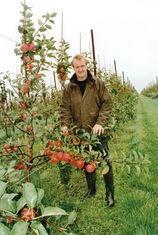
Two speciality trademarked dessert apple varieties, Greenstar and Kanzi, will be taking a more central role this season.
Exclusively grown for Tesco by Adrian Scripps Ltd, harvesting of both crops got underway this week, with the news that, despite the variable weather through the spring and summer, they are looking good and already living up to expectations.
“The whole industry has had a difficult time,” says Richard Scripps, chairman of the company, whose four Kentish farms also make it one of the most substantial UK producers of Braeburn, Gala, and Bramley, as well as pears. However, being able to provide irrigation and mulch trees has meant that fruit size is far more satisfactory than he originally envisaged. Although picking dates are about a week later than forecast, improved rainfall and cooler nights in September and October enhanced both size and skin colour, he explains.
Scripps says he was attracted to Greenstar as a mid-to-late season green apple with its attractive bright green smooth skin and white crisp juicy flesh, back in the mid-1990s after seeing it being grown in Belgium. It is a Delcorf/Granny Smith cross and made its first appearance on the Tesco stand at the National Fruit Show two years ago.
It is not regarded as a winter substitute, however. “It can take its place in the UK spectrum of varieties because of its own attributes,” says James Simpson, managing director. “Sugar levels are good, particularly after storage, and it has an excellent retail shelf life. After cutting, the flesh remains white due to the high levels of vitamin C.”
Planting of Greenstar started in 2003, and this year the initial orchards, covering 11 hectares, will be in full production for the first time with the expectation that these will yield around 50 tonnes per hectare which is regarded as heavy by English standards.
A further 17ha which was put in a year later are now beginning to come on stream giving a total potential commercial production this season of around 750t, which will reach 1,500t by 2010, bringing it in line with many traditional varieties.
Kanzi, which is Swahili for “hidden treasure”, could not be more different, with its bright pinky-red blush, although it is similar in skin finish and yield. A Gala/Braeburn cross which also originated from the Belgian breeder Johan Nicolai, Richard Scripps regards it as a mid-season variety available from November and until stocks last.
The first 15ha were planted at Wenderton Farm in 2004, which has since risen to 30ha between Scripps’ Hononton and Parsonage farms.
“We had a small crop last year but are following the same expansion route as Greenstar,” Scripps says. “Because it is also a heavy cropper we are expecting it to finally produce the same amount of fruit.
“And so far the commercial results for both have lived up to expectations. We are aiming to plant more, but at present we are pushed for room.”
Both varieties will become part of Scripps’ normal replanting programme, which annually rotates about eight per cent of its top-fruit crop to ensure that no orchard passes its optimum bearing age.
At the same time there is another factor that is playing its part in getting the fruit to the retail shelf as fast as possible.
Six years ago, Scripps and his father Adrian, now retired, recognised the value of growing fruit supported on trellises, a practice widely adopted in Holland and Belgium.
In the UK and much of Europe we rely on dwarf root stock which needs support for life,” says Scripps. “The trellis system enables us to plant much larger, specifically-produced trees which can be better managed and allow us to achieve higher yields of up to 20t per hectare for apples and 15t per hectare for pears a year earlier. The density of 2,666 trees per ha is similar to conventional growing.”
Scripps was the first grower to put these beliefs to the test in the UK. Initial plantings of pears took place in 2002 at Parsonage Farm at Cobham, Kent, and was so successful that more followed in successive years at the firm’s Hononton Farm, near Brenchley, Wenderton Farm on the outskirts of Wingham and Sherenden Farm near Tudeley.
The result is that there are now 70ha benefiting from the system, supporting Greenstar, Kanzi, Bramley and pears. Trellising now accounts for 20 per cent of the total production area, and Scripps says the changeover will continue as part of its commitment to growing the best UK top fruit possible.